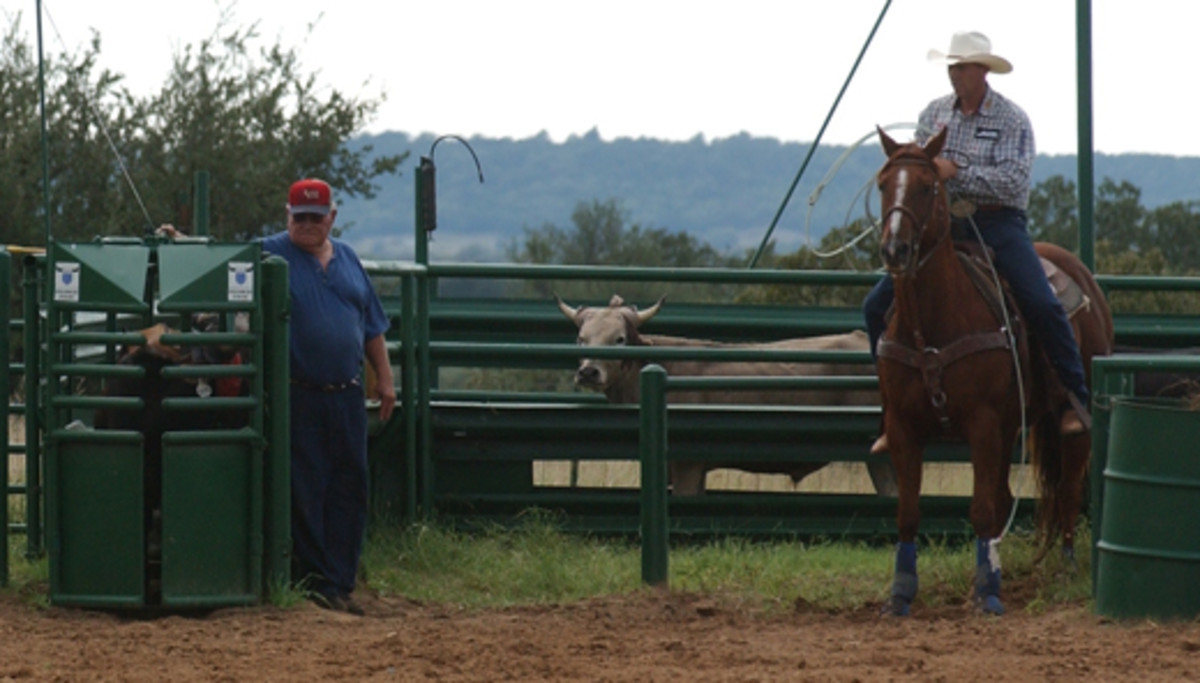Scoring is a topic that always comes up. Everyone has questions about scoring, and it’s always one of my priorities in roping because the start you get sets the tone for the run. Scoring is the most crucial part of roping at every level, especially at the top level where every tenth of a second can be the difference between first and not placing a lot of times.

There’s a small percentage of horses that score good naturally. You could run 10 steers in a row, and on the 11th one he still won’t anticipate one of the signals. The signals that cue a horse to want to take off include the sound of the gate opening, the movement of the steer and the heel horse leaving. Those things tell your horse it’s time to go.

That anticipation is so hard on a horse. You need to have enough tension on the reins when the gates bang so he doesn’t take off. You need to score a lot of cattle to take away that anticipation. Throughout my whole career, I’ve only ridden about three horses that just back in there, let me take ahold of them and stand there as long as I want. Then they left there like rockets when I released them.

Since most horses aren’t naturals when it comes to scoring, you need to work at it. I spend a ton of time scoring numerous steers all the time on all my horses. We’re all guilty when we practice of not scoring enough steers. Scoring takes time, effort and discipline, but it pays off.

Even though scoring is time-consuming and boring, especially for the heeler, you need to realize it’s for the good of the team. I don’t put any particular number on how many steers I score, but I score as many as my horse needs. If my horse jumps at the gate, I’ll pull him up and not even run the steer.

Scoring was one of my good horse’s (Barney) weakest traits when I got him, so I’ve really worked on him in that area. I don’t make practice runs on him anymore, because he doesn’t need it, but I do score steers on him in the practice pen, just like I do all my other horses.

I think if you did a survey with the top 50 ropers and asked them the most crucial part of roping, they’d say scoring. You score as good as your horse scores. If he jumps when the gate bangs, you’ll counter-react by pulling and lift his front end off the ground and be late. Or he might run through the bridle and break the barrier.

Usually a horse that’s nervous or hot in the box won’t score all that well. You have to spend even more time on horses like them, to help them relax in there.

Your headgear is really important to your scoring, too. Your tiedown and bridle need to fit right, so when you take ahold of your horse he doesn’t throw his head in the air and get away from you. If you’ve got too much bridle on a horse, you’ll lift him up off the ground. You’re looking for a happy medium. A horse with a bad tooth can be hard to score, too.

Some of the things you can do to help your horse score better include giving up some of your roping time to help your horse score better. You can quarter a horse to the right if he tends to take off too early, because he has to step across himself to break out of there. It’s basically cheating, but can be a helpful trick to get you by in a bind.

Another trick of the trade the top guys use is stuffing their horses’ ears with cotton to eliminate some of the chute noise and the gates banging. Sight isn’t the only sense a horse uses to try to figure out when to leave there.

You have to build your horse’s confidence. Pet on your horse when he does it right and don’t pick on him too much. When you score, do the same things you usually do before you nod or you’re wasting your time. If you back in there with loose reins and no heeler, your horse will know you aren’t going to go. Make it realistic. I even have my heeler leave when the gate opens when I’m scoring. Heelers don’t like to blow out of there real hard, but I like to have some kind of movement on that side. They can always use their practice horses. Most of the top ropers practice for their horses, because they realize how critical it is to score on them and free them up.

Remember, the better your horse scores, the better start you’re going to get and the easier it’s going to be to pinpoint your start. If a running steer gets a jump on you and you miss the barrier, you might as well pull up. You have no chance. It’s important that your horse leaves there flat and balanced, and running full speed ahead from the back of the box on.










